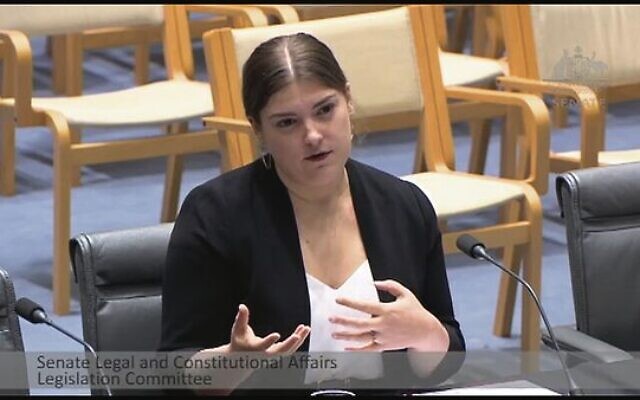Australia ‘decades behind’ on Nazi symbols ban
The inquiry heard from a wide range of communal organisations, including Jewish communal leaders, the Australian Muslim Advocacy Network and the Hindu community.
NAZI and neo-Nazi symbols are used to express hatred and menace against Jews and other Australian minorities – but are also dangerous recruitment tools, particularly online.
These points were made by Jewish communal leaders on Tuesday to the Senate’s Legal and Constitutional Affairs Legislation Committee, which is looking into a Prohibition of Nazi Symbols bill.
Invited by committee chair, Queensland Labor Senator Nita Green, Executive Council of Australian Jewry co-CEO Peter Wertheim reported a federal ban has strong support in the Jewish community, with all state roof bodies having made representations to their governments. “Other measures are clearly needed, especially in the field of education, but legislation is an essential part of any package of measures,” he said.
Charting the rise in antisemitism, Australia/Israel & Jewish Affairs Council (AIJAC) executive director Colin Rubenstein said banning Nazi symbols – aside from artistic and educational purposes, and religious expressions – is “not breaking new ground” globally, and Australia is “decades behind” Austria, Germany, France and Sweden.
AIJAC public affairs director Walt Secord, a former NSW Labor MP, said, “This legislation won’t stop Nazism and hatred, but it will punish and marginalise their views.”
Breann Fallon, manager of student learning and research at the Sydney Jewish Museum, who works closely with survivors, said the law must be wide enough to prohibit new symbols and hate language. She recommended the bill be expanded to the scope of Germany’s legislation, which is not limited to visual symbols, but includes “slogans and forms of greeting”.
Andre Oboler, CEO of the Online Hate Prevention Institute, said Nazi and neo-Nazi symbols “are used for recruitment … those symbols also engage people in Australia who are engaged in a path of radicalisation with similar groups overseas”.
However, Australian Jewish Democratic Society (AJDS) representatives Harold Zwier and Larry Stillman said banning Nazi symbols misses the point that hatred today targets many minorities in Australia. “The legislation is essentially performative, symbolic and somewhat off the target in dealing with current hatreds and potential for violence, which extends far beyond Holocaust symbolism,” said Zwier.
Fearing a ban could cause “amplification” of neo-Nazi activity in Australia’s media, Stillman alleged, “Neo-Nazi groups are now in fact staging otherwise unknown, provocative events, taking photos and then passing them on to Jewish organisations such as the Anti-Defamation Commission, who then notify the media to express outrage. In fact, Jewish organisations and political leaders should act with the media to reduce public exposure of this sort of material.”
Quoting from ECAJ’s written submission, Queensland Liberal Senator Paul Scarr, the committee’s deputy chair, noted the direct link between neo-Nazi symbolism and violence. “Placing Nazi signs or carrying a Nazi flag or performing a Nazi salute on or in the vicinity of a synagogue, mosque or temple, or a Holocaust museum, is not an expression of an idea, but a naked threat and a promotion of hatred and violence.”
The inquiry heard from a wide range of communal organisations, including the Australian Muslim Advocacy Network and the Hindu community.
The Jewish organisations had earlier made written submissions to the inquiry.


comments